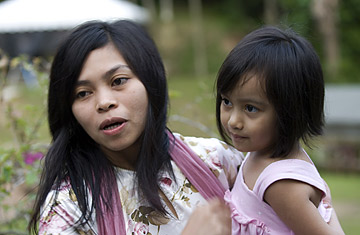
Muslim woman Kartika Sari Dewi, 32, who will be caned for drinking alcohol, is pictured with her daughter Wan Kaitlynn Sari Dewi
Malaysia prides itself on being a multiethnic democracy where numerous religions coexist. But its reputation as a moderate Muslim-majority nation has been called into question by a monthlong controversy over whether a Muslim mother of two, Kartika Sari Dewi, should be whipped for a peculiar crime: drinking a beer in public. On Aug. 24, Kartika was due to become the first woman in Malaysia to be caned, after an Islamic court sentenced her in July to six lashes. But Islamic officials suddenly delayed the corporal punishment just hours before she was to endure the lashing.
Kartika, 32, had steeled herself to her punishment after having pleaded guilty to consuming alcohol while at a resort in 2007. On Monday morning, she donned an Islamic headscarf, planted a kiss on the cheek of her 5-year-old daughter and got into a van to make the 270-km journey to a women's prison outside the capital of Kuala Lumpur. Instead, the van pulled over after just 200 m while officials from the Prisons Department, the Attorney General's chambers and the Islamic courts argued over the case. In the end, a decision was made to defer the caning because of the Ramadan fasting season that had started on Sunday. "This is sad, [because] I am being kicked about like a football," Kartika said on her return home. "I was hoping to be caned and get on with my life."
As Kartika awaits her punishment, Malaysian Prime Minister Najib Razak spoke out on Tuesday, advising her to appeal her sentence. Kartika's case has sparked global condemnation, and presumably Najib would prefer not to deal with any body blows to Malaysia's international status. "I believe the authorities concerned are sensitive on this matter and realize the implications of this case," he said at a press conference. "I feel the person concerned should appeal to the state authorities and not be so willing to accept the punishment."
Malaysia operates a dual-track legal system in which Muslims are bound by Shari'a law for certain issues while non-Muslims are processed through civil courts. While alcohol consumption is illegal for Muslims according to Shari'a law, many people of the Islamic faith in Malaysia do drink, and prosecution for such a crime is rare. Perhaps fearing a backlash from Islamic officials, Kartika lodged a police report on Monday saying she is not a party to the decision to postpone the caning. "We don't want to be blamed later," she said, "[by people who might say] that we had avoided punishment and embarrassed Islam."
Prisons Department officials are facing the dilemma of how to carry out the caning. "We have have never done it to a woman, and we don't know how to do it," said a department senior official who asked not to be named. There is not a single female in the department trained in the "Islamic way" to cane. Nevertheless, prominent Islamic officials in Malaysia have expressed disappointment at the reprieve. "The punishment is light and designed to shame, not to cause physically pain," Harussani Zakaria, an influential cleric, told TIME. "It must be carried out." Counters Amnesty International's Malaysia director, Nora Murat: "Whipping is a form of torture and should not be condoned."
Back at her village, Kartika break down into tears as friends come to comfort her. As she counts down the days to her fate, it is Malaysia's image as a moderate and inclusive Islamic nation that will continue to take a beating.
